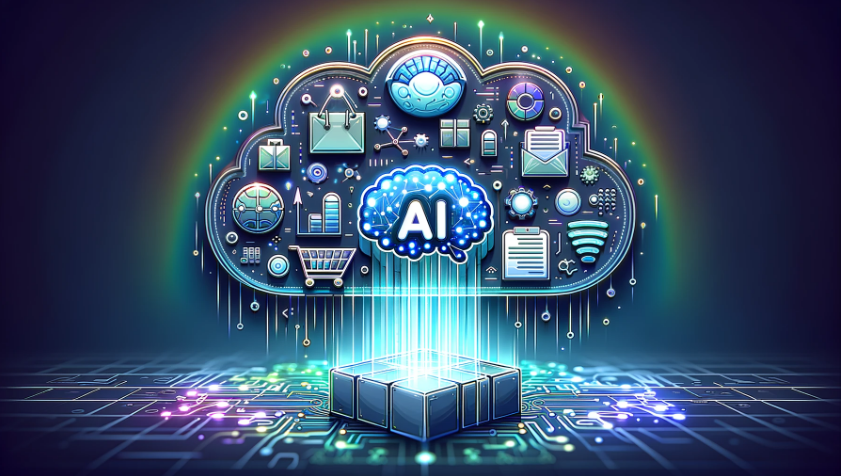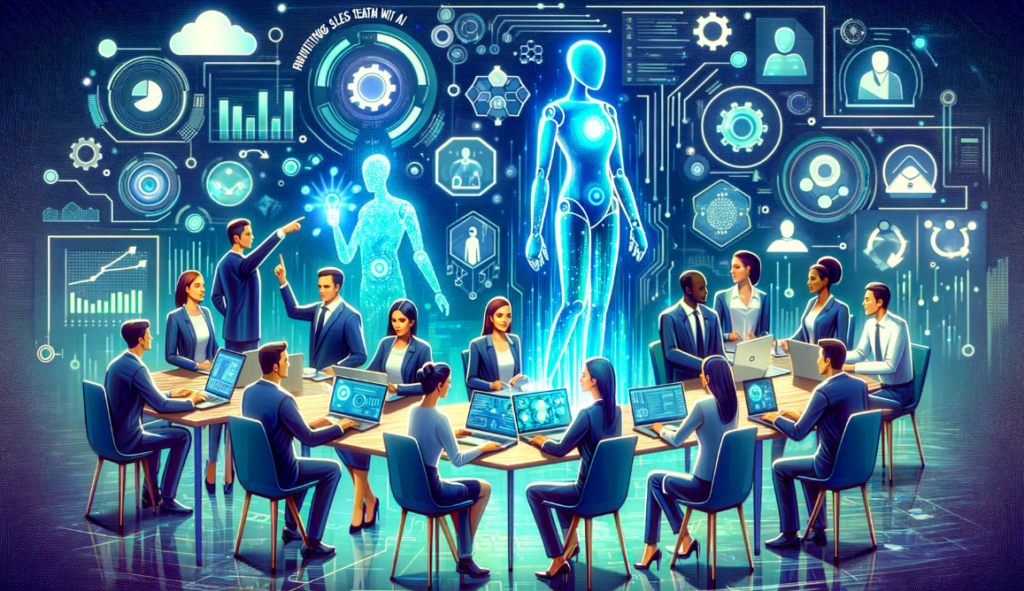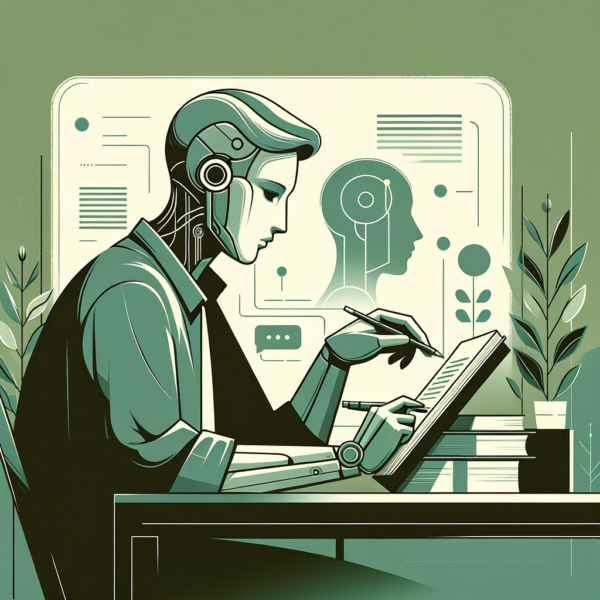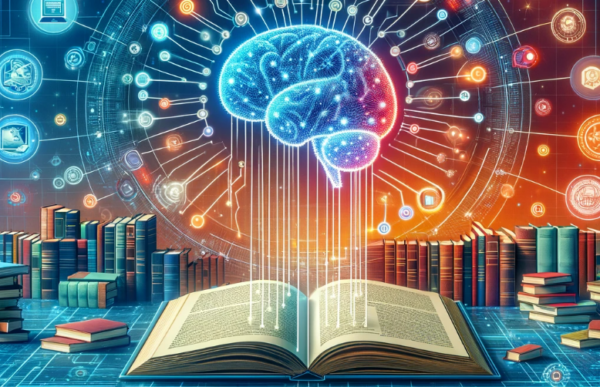In the ever-evolving landscape of commerce, the integration of Artificial Intelligence (AI) has ushered in a revolutionary era, redefining the paradigms of AI distribution and sales. This transformative wave is not just a fleeting trend but a fundamental shift in how businesses operate, strategize, and interact with their customers.
The purpose of this article is to delve deep into the multifaceted impact of AI technology on the realms of AI distribution and sales, marking a departure from traditional methods to more advanced, efficient, and intelligent practices.
As we embark on this exploration, it becomes essential to understand that AI is not merely a tool but a game-changer that is reshaping the core of commercial activities. From optimizing supply chains to personalizing customer interactions, AI’s footprint in commerce is vast and varied.
This article aims to unravel the complexities and intricacies of AI distribution and sales, offering insights into how this technology is not just augmenting but also revolutionizing the roles of sales reps, transforming distribution, redefining sales teams, and continually evolving as a technology.
As AI continues to advance, it promises not only enhanced efficiency, customer satisfaction, and productivity but also opens up new avenues for innovation and growth in the world of distribution and sales. This journey through the AI-driven landscape of commerce will provide a comprehensive understanding of the current state, ongoing developments, and the exciting possibilities that lie ahead.

The Rise of AI distribution and sales
The landscape of distribution and sales has been historically characterized by human-driven processes and decision-making. Traditional methods in these fields relied heavily on manual inventory management, face-to-face sales techniques, and intuition-based forecasting.
Distribution was largely a linear process, where products moved from manufacturer to warehouse to consumer in a predictable fashion. Sales strategies, on the other hand, were built around personal relationships and often lacked the ability to leverage large data sets for deeper customer insights.
The introduction of (Artificial Intelligence) AI distribution and sales, has initiated a paradigm shift. Recent advancements in AI technology, such as machine learning algorithms, predictive analytics, and natural language processing, have started to transform these conventional practices. These technologies enable more sophisticated data analysis, automating tasks that were previously time-consuming and prone to human error. For instance, AI can now predict market trends with high accuracy, optimize inventory levels based on real-time data, and provide personalized product recommendations to customers.
Businesses are increasingly recognizing the potential of AI-driven strategies to enhance efficiency, reduce costs, and improve customer experiences. The shift to these strategies is evident in various aspects of distribution and sales. In distribution, AI is being used for demand forecasting, route optimization in logistics, and automated warehouse management systems. In sales, AI-powered chatbots and virtual assistants are revolutionizing customer service, while AI-driven CRM (Customer Relationship Management) systems are enabling those that work in sales to understand and anticipate customer needs more effectively.
This transition to AI-driven methods is not without its challenges. It requires significant investment in technology and training, along with a cultural shift within organizations to embrace data-driven decision-making. However, the businesses that are adapting to this change are finding that the benefits far outweigh the costs. They are experiencing increased agility, enhanced decision-making capabilities, and an ability to stay competitive in a rapidly changing market.
The rise of AI in distribution and sales is a testament to the transformative power of technology in reshaping industries. As AI continues to evolve, it is poised to unlock even more innovative and efficient ways of conducting business in the commerce sector.
Your Publishing Journey Awaits – Start Now
Sales Reps in the Age of AI distribution and sales
In an era where technology is rapidly advancing, the role of sales representatives is undergoing a significant transformation, largely influenced by the advent of Artificial Intelligence (AI). This shift is not just a change in tools and techniques, but a fundamental reimagining of the sales rep’s role in a data-driven, AI-enhanced landscape.
Changing Role of Sales Reps: From Traditional to AI-Enhanced Approaches
The advent of AI in the commercial landscape has fundamentally altered the role of sales representatives. Traditionally, sales reps relied on a combination of personal experience, intuition, and relationship-building skills to close deals and maintain customer relations.
AI technology identifies territories that could be improved to enhance profits. This is because the integration of AI into sales processes has shifted the focus towards data-driven strategies and personalized customer engagement.
AI helps sales reps maximize profits as they can access and analyze vast amounts of customer data quickly, offering insights into customer preferences, their buying habits and patterns, and market trends. As such, AI tools collect valuable data , which not only enhances the efficiency of sales reps but also allows them to provide tailored solutions and experiences to clients, thereby elevating the quality of customer service.
AI Technology Powered Tools for Sales Reps: Examples of Software and Platforms
Several AI tools and platforms have emerged to support the modern sales rep. For instance, CRM systems enhanced with AI capabilities, like Salesforce Einstein, provide predictive analytics and lead scoring, helping sales reps prioritize their efforts on the most promising leads.
AI-powered chatbots, such as Drift and Intercom, assist in engaging prospects and answering queries in real time, thereby optimizing the customer journey. Tools like Gong and Chorus.ai analyze sales calls using natural language processing to provide feedback and coaching tips, enabling sales reps to refine their communication skills and strategies. These tools represent a fraction of the burgeoning AI ecosystem designed to augment the capabilities of sales professionals.
Your Publishing Journey Awaits – Start NowTransformation of the Distribution Industry
The distribution industry, a critical backbone of global commerce, is undergoing a remarkable transformation thanks to the advent of Artificial Intelligence (AI). This shift is revolutionizing business processes, including everything from inventory management and warehouse automation to logistics and supply chain optimization, marking a new era of efficiency and intelligence in distribution.
Impact of AI on Inventory Management and Logistics
AI has significantly improved inventory management, making it more efficient and accurate. Through predictive analytics, AI systems can forecast consumer demand with high precision, allowing companies to optimize their inventory levels and reduce waste. This technology also plays a pivotal role in logistics, where AI-driven algorithms are used for route optimization, reducing delivery times and costs. AI-powered drones and robots are increasingly being used in warehouses for picking and sorting tasks, enhancing speed and reducing human error.
AI in Supply Chain Optimization
In the realm of supply chain management, AI is a game-changer. It offers real-time insights and predictive modeling, enabling companies to predict consumer demand, anticipate supply chain disruptions and respond proactively. AI systems analyze vast datasets to identify patterns and inefficiencies, suggesting improvements for supply chain operations. This technology also enhances transparency in the supply chain, providing detailed tracking and tracing of goods, which is crucial in today’s globalized trade environment.
Real-world Examples: How Leading Companies are Integrating AI Distribution and Sales
Leading companies across various industries are embracing AI to revolutionize their distribution strategies. For instance, Amazon has implemented AI in its vast network of fulfillment centers, using predictive analytics to enable warehouse automation to anticipate order volumes and optimize stock levels. This approach minimizes overstocking and understocking, ensuring timely deliveries. In another example, DHL uses AI for route planning and optimization, which has significantly reduced its carbon footprint and operational costs. Similarly, Walmart leverages AI for both inventory management and demand forecasting, ensuring that its stores are stocked efficiently based on real-time consumer behavior and trends.

AI distribution and sales in the Book Publishing field
The book publishing industry is witnessing its own unique transformation with the integration of AI in distribution and sales. AI’s capabilities are being harnessed to reshape how books are marketed, sold, and distributed globally. From utilizing predictive analytics for understanding reader preferences to automating marketing campaigns for new releases, AI is playing an increasingly pivotal role in reaching audiences and optimizing sales channels.
However, the need for AI in book distribution is not universal. Spines recognizes that while AI provides solutions for many industries, the art of book distribution benefits from a more direct approach. Our system has been meticulously designed to automate the distribution of books across over 100+ global channels, including major retailers like Amazon and Barnes & Noble. By prioritizing a streamlined and efficient distribution process, Spines eliminates the complexity that AI systems can sometimes introduce.
We focus on leveraging high-tech solutions to monitor and track all distribution channels effectively, providing our authors with a sophisticated royalty reporting system. This approach ensures that authors can easily access sales data, understand their earnings, and gain clear insights into their global reach without the need for AI intervention. Spines’ commitment to simplicity, clarity, and efficiency in book distribution positions our authors for success in the dynamic landscape of book sales, empowering them with the tools they need to thrive in the digital age.

Reinventing Sales Teams with AI
The integration of Artificial Intelligence (AI) in sales has not only changed the tools and techniques used in this domain but has also fundamentally altered the structure and functioning of those working in sales. This new dynamic between AI and human sales employees is creating more efficient, effective, and intelligent ways of selling.
Collaboration between AI distribution and sales and Human Sales Teams
The collaboration between AI and humans in sales marks a significant shift from traditional sales practices. AI analyzes sales history to identify successful patterns and areas for improvement, providing sales teams with actionable insights to refine their strategies. Also, AI systems handle data-heavy tasks such as lead qualification, customer segmentation, and predictive analytics, allowing sales professionals to focus on relationship building and strategic selling.
This synergy enhances the sales process, as AI provides deep insights and recommendations, while human team members use their emotional intelligence and creativity to tailor approaches to individual clients. For instance, AI can identify promising leads, but it’s the human touch that ultimately closes deals through personalized interaction and relationship management.
Training and Skill Development for Sales Teams in an AI-driven Environment
As AI becomes more embedded in sales processes, training and skill development for those working in sales have become crucial. Sales professionals need to be adept not only in traditional sales techniques but also in using AI tools and interpreting their outputs. Training programs now increasingly focus on data literacy, understanding of AI-driven analytics, and the strategic use of AI recommendations in sales planning. Additionally, there’s a growing emphasis on developing soft skills such as adaptability, problem-solving, and emotional intelligence, which are essential in a technology-driven sales team and environment.
Future Outlook: Predictions and Trends for Sales Teams Working with AI
Looking ahead, the role of AI in sales is expected to grow even more significant. Predictive analytics and AI-driven automation will continue to streamline sales processes, making them more efficient and accurate. There’s a trend towards more personalized, AI-driven customer experiences, which will require sales teams to adapt and innovate continuously. Furthermore, as AI technologies evolve, they will open new avenues for engaging customers and understanding market dynamics. Sales teams that can effectively integrate AI into their strategies and operations will not only stay ahead in efficiency but also in creating deeper, more meaningful customer relationships.






